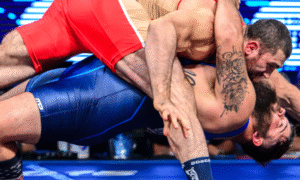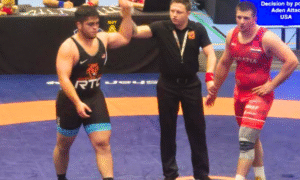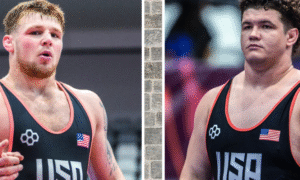Five Point Move is proud to host USA Greco-Roman National Team head coach Matt Lindland each week for Coach Lindland’s Report. Here is where you will find detailed perspectives from Coach Lindland regarding results, training, upcoming events, and other Greco-related news that isn’t available anywhere else. ALSO — if you would like to donate directly to the US Greco-Roman program, just click here. Your support is appreciated!
Nearly two months have come and gone since the last Coach Lindland’s Report and a lot has transpired in that time frame. The biggest bit of news, of course, was Adam Coon (130 kg, Cliff Keen) advancing to the 2018 World final a little more than three weeks ago, becoming the first US Senior medalist since Andy Bisek in 2015. But Coon’s performance wound up as the main highlight for a squad that once again struggled to string together wins at the premier event of the season, resulting in additional frustration and bewilderment on the part of athletes and coaches alike. The U23 Team’s inability to break through last week in Bucharest has only added to the perception of a US program still at odds with stamping down its identity.
In this, the Thanksgiving edition of the Report, US National Team head coach Matt Lindland explores these topics in depth and lays out the areas he feels are most in need of improvement. There were positives to be gleaned from the Senior Team, but that is precisely why the performance in Budapest, outside of Coon’s showing, stung so hard. The premier issues Lindland believes to have held the Seniors back — attitude, lack of discipline, and a resistance to relentlessly embrace the task at hand — he also defines as correctable. But first must come the cohesion that is necessary to move forward; and a factor he points to repeatedly, the demonstration of gratitude towards the opportunities which arrive in concert with being able to compete at the sport’s highest level.
5PM: It’s the eve of Thanksgiving. You get into this holiday, what does it mean to you right now?
Coach Matt Lindland: I have so much to be thankful for in my life. I live in the greatest country in the world. I have a wife and children who love me and whom I love. I have been blessed my entire life to have the opportunity to chase my dreams and pursue my own path. I now have an opportunity to lead young men and teach them that they are truly free to chase their dreams and reach their goals. I have also surrounded myself with incredible people.
5PM: Focusing on the Seniors specifically, what is the primary takeaway from a tournament that aside from Coon, didn’t unfold as hoped or expected?
ML: This is the toughest wrestling event in the world. If this tournament can take out the best wrestlers — which it did, World champs were dropping matches and many top performers and returning medalists went home empty handed — then we can learn what it going to take to break through to the next level. We can learn to change our expectations for what is “normal” and what we need to do to exceed at the next level. It is not our talent or physical skills that are lacking, but our discipline, mental toughness and the expectation of what it actually takes.
We must raise the level of what is expected out of us each and every day. We need to ask ourselves, Are you willing to do what it takes? Are we willing to change the expectation of what is “normal” training for this level? We need to change our expectations of what it really takes. I think we are just lying to ourselves about what it really takes and how much we really need to sacrifice, struggle, and suffer.
In 50 years, USA has averaged about one World champion in Greco per decade. That doesn’t change overnight. It’s a cultural issue, it is a systemic problem, and it takes time to change the culture. There is no question we have the athletes who are capable, but the question becomes, Are they willing?
We need to change the way we look at the opportunities we are given and appreciate the struggle and sacrifice, understanding we are being refined and molded into what we need to become to reach our goals. Everyone who has ever achieved greatness has had to go through this same process.
5PM: Is there a disconnect between what the current generation of athletes expect or how their approach is, and how previous generations approached competition and training?
ML: Maybe, but I mean, most of these guys were around when Andy Bisek got his medals. They were around to see how hard you have to train, how much effort, and what it takes. None of these guys have to make nearly the same amount of sacrifices that Andy made. The guy had two kids and another on the way when he was doing this, you know? He had a job at a liquor store while he was doing this. They’re all worried about recovery, Andy was worried about putting food on the table.
5PM: Since this was going to come up and there was talk about it afterwards, was the training too much leading up, were the camps too long?
ML: I think it pays to keep things in perspective. You chose this journey. You get to do exactly what you chose, be grateful and be thankful. If you are not grateful for the opportunity to chase your dreams, then find a new dream, or stop dreaming. This isn’t easy, not at this level. We saw how hard it is at the Senior Worlds firsthand.
But was it too long, too much? How? Built into the entire training plan was accommodation for recovery, as well as plenty of space for athletes to have the freedom to prepare on their own. If we break it down, the training for the Worlds looked like this — we had five camps with built-in recovery in between each one, and each camp also carried a specific purpose and objective.
Base Camp in Oregon, two weeks — The goal was to build the base conditioning for the next 17 weeks along with team bonding and character development. Two weeks of individual time for athletes followed. Individual time was accounted for after each camp. 57% of the training phase, you were on your own and had full autonomy of your own training. If you didn’t get what you needed, that’s on you.
Las Vegas, one week — High repetitions on your technique and designing and implementing the athletes’ individual wrestling plan. Individual prep for one week afterwards.
Germany, tournament and one week-long camp — Test yourself and discover what adjustment need to be made. Two weeks of individual time after arriving back home.
World Team Camp at the OTC (Olympic Training Center), two weeks — Highest-intensity partners were there to serve World Team members’ needs. The objective wasn’t to prove, but to improve. Two weeks in between OTC camp and the departure for Hungary.
Tata camp, 10 days— Final adjustments and hard training with plenty of built-in recovery. One mat practice per day, really just winding down. Then we traveled to Budapest and tapered for a week, just like it was indicated well in advance and what everyone knew.
Again, perspective. Look, we get the opportunity to go play a game and sport-fight. Consider the servicemen and women sacrificing everything so we have the freedom to do what we love and follow our dreams. We are blessed, period. This is not an obligation, but an opportunity. Our service members go on deployment for months at a time and have to be ready to fight on a moment’s notice. Us? We get to play-fight!
I want to thank the men and women who fight for the freedoms we enjoy like having the opportunity to chase our dreams and play sport fighting. We had Marines with us who helped Team USA, and these men contributed and sacrificed for our #1 athletes. These Marines have perspective and are grateful they aren’t conflict zones like Syria, Iraq, Somalia or Afghanistan. They are in Hungary doing what they love to do.
5PM: While we’re at it, what about draws? I completely understand the scope of competition, I know how skilled and accomplished a lot of these foreign opponents are, intimately in some cases. But there seems to be a heightened focus on draws and I wonder if it’s a defeatist mentality, if only because at a World Championships, each match essentially carries the same assigned value and consequence, regardless of how good an opponent is. It is often ‘Oh, the US guys all have a tough draw first-round’, or ‘His bracket is stacked’. And it’s true a lot, obviously, you can’t distort reality. Drawing World medalists or champs is not easy. But my question is, when does it become, ‘I’m the bad draw’?, ‘I’m the guy who is the problem in the bracket’? I obviously don’t know from experience, I just imagine that’s a healthier mindset.
ML: That is the mentality you have to approach every match with, I’m the bad draw; it doesn’t matter who I face or who is on my side, I am the bad draw. But again, that comes back to attitude. You are either a vic-tim or a vic-tor. You can’t be a champion with a victim mentality. And when we’re talking about an incorrect attitude, we’re talking about having a victim mentality. It cannot be, Oh, I have to do this. No, you have an opportunity to do this. You don’t have to wrestle at a World Championships. You don’t have to participate. You chose to do this. You showed up to make the Team and receive the opportunity to represent the United States at the World Championships. Everything you are doing is an opportunity, not an obligation. Of any kind.
5PM: Given the results and all that went into Budapest, what would the specific message be to the athletes now that it’s in the rearview?
Coach Matt Lindland: Put things in perspective and see how close we really are. We have the athletes in our programs who are capable of winning, but attitude is everything. If you competed and lost, realize how tough this tournament is. More importantly, realize how much tougher you are going have to become, not just physically, but emotionally and psychologically, as well. We must build up some armor and develop resiliency, not let anything affect us, and stop being discouraged by setbacks, tough situations, fatigue, or grueling schedules. Those things need to become normal situations that you’re used to, not shaken by, and instead, things you actually embrace, seek out more of the struggle, and you learn to thrive in this adversity.
It’s what’s inside that counts. There was a story of a guy who sold balloons at the fairs. He had all of these colors, red, blue, yellow, green. Whenever business would slow down, he’d release one of these helium balloons at the fair and people would want to go find this guy who was selling the balloons. The kids would come up and ask if they could buy one. And every time things would slow down, he’d release another in the air.
So one day, this kid comes up to him, Sir, sir, if you release the black one, would that one fly, too? The guy answers, Of course it would fly. It’s what’s inside the balloon that makes it fly.
It’s not the color, it’s not the shape. It’s the attitude that you have within you. That is what is going to help you rise. It has nothing to do with anything else. It is how you approach this and the attitude you approach it with. It doesn’t matter what the plan was. If you approached it right, I think these guys could have had success.
5PM: U23 was a different story. The end result obviously wasn’t fantastic, but they were on a different schedule, aside from Tracy (G’Angelo Hancock). Why has that event been such a tough one for the US in its first two years?
ML: For the sport itself, U23 was excellent. It was exciting. I think the reason why it was even more exciting than the Senior Worlds is that these guys are as skilled technically as the Seniors, they’re just not as positionally disciplined. So, they make little mistakes. And when they make these little mistakes — reach, whatever, give up the underhook — they allow their opponents to score big moves. I see that in our guys, we are positionially deficient. When you make a mistake, you can overcome your positional deficiencies if you are extra aggressive and taking the fight to your opponent. But if you’re waiting, as soon as you make a mistake because you’re timid instead of making a mistake because you are over-aggressive, I think there is a big difference there.
U23 for our guys was tough, obviously. Other than Nolan Baker, who was an absolute beast.
5PM: Baker was impressive, very. No international experience, no feel for foreigners. He was just like, This is what I have, this is what I’m going to do, try to stop it. He scored 14 points and got tech’ed twice, but he really poured it on.
ML: It was the same thing Adam Coon did. Here’s my offense, I am going to impose my offense. If it works, great. If it doesn’t, at least I tried.
What I really saw was very parallel between those two guys. What’s the one thing they have in common? Well, they both come from the folkstyle system. Maybe I am completely wrong in saying we can take these great athlete and raise their level to compete with the best guys in the world. Well, we’ve proven it with Kamal (Bey) and Tracy competing and winning against guys on the World level. But it comes down to consistency, it comes to discipline and structure.
5PM: Maybe related to a question I asked earlier, but your medals didn’t come until the end of your career. You experienced disappointment, it’s not like you made every single Team, and so you probably understood the gravity of what that kind of opportunity meant. Do you think that it is different for athletes who haven’t had to struggle to make Teams early in their careers? Is there such a thing as taking it for granted?
ML: I think that’s an incredible question, and I think it’s true. It comes down to mindset all the time, the growth versus fixed mindset. I’ve even brought that out in PowerPoint presentations. And I’ve seen it before. If you’ve had success early in your career, you might think this is easy. This is all I have to do? I won a state title, I won a National title… And now they’re making a World Team, It can’t be as hard as the coaches are saying. You don’t have to make such a big commitment and all of these sacrifices we’re hearing about because it comes so easily?
That’s human nature. We’re constantly inventing things to make life easier. It’s Thanksgiving, well, when the Pilgrims came over here, they were worried about harvesting food. They knew what it meant to harvest, to put all that work in. You don’t get to harvest until you nurtured and put all of this time and effort into planting and sowing seeds. I’ve done this, I’ve sowed seeds and tilled the fields. But I have also done it metaphorically in my career. I planted these seeds.
A person cannot be successful without having character, commitment, conviction, and the courage to actually struggle. We hate the struggle. We talk about how it is about the struggle, the adversity, the discipline, but you may not have really had to deal with it before and you’ve already had success, even if you talk about those things as though you have. Now you’re at a level where everyone is as good or better than you. And right now, they are all proving they’re better than us because the opportunity you have to show how good you are is at those World Championships. That’s the only tournament that matters the entire year, until that fourth year when the Olympic Games come around.
The trials, tragedies, and triumphs, depending on how we handle these, really determine how we progress through life. The triumphs don’t come without effort, without struggle and toil. You don’t get to harvest on Thanksgiving without planting the seeds and doing the work that it takes throughout the season. The harvest season is really a metaphor for what we’re talking about. You plant in the spring; and in the summer you’re just working, working, working, and you don’t see any fruit. You don’t see them until the autumn when you get to harvest this fruit. But it’s not there, and all we’re seeing is the work and the struggle.
5PM: What about pressure? That has to enter into the equation in a big way, at least on the periphery. You dealt with pressure and disconcerting circumstances prior to the Sydney Games, is there a way you have related that experience to the athletes?
Coach Matt Lindland: I have shared that, I think it’s a great lesson on staying focused and not letting anything get in your way. I wanted it so much, but when I was forced to just not stress about winning, and instead, just be grateful for the opportunity to chase my goals… It’s a privilege to be able to travel the world doing what I love to do. Understand the blessing it is to have opportunity to wrestle for Team USA, the greatest nation in the world. This is such a hard paradox to understand, love the process no matter how hard it is, have fun in the struggle, and enjoy your Team while doing what you love to do.
Follow Coach Matt Lindland on Facebook, Twitter, and his official blog for updates on the US Greco-Roman Wrestling program.
CLICK HERE TO DONATE TO THE USA GRECO-ROMAN PROGRAM
SUBSCRIBE TO THE FIVE POINT MOVE PODCAST
iTunes | Stitcher | Spreaker | Google Play Music | RSS



















